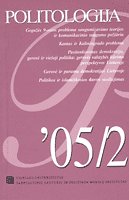Vaizduotë Ir Teisingumo Sprendimai
Immagination And Justice Judgments
Author(s): Inga VinogradnaitėSubject(s): Cultural Essay, Political Essay, Societal Essay
Published by: Vilniaus universiteto leidykla & VU Tarptautinių santykių ir politikos mokslų institutas
Summary/Abstract: The purpose of this article is to research the role imagination plays in making of justice judgments. It is argued that by taking into account the activities, enabled by imagination, we are in a better position to explain the factors influencing judgments of distributive justice. The empirical research of distributive justice has shown that context is important in deciding which norm of distribution has to be applied. Still, to explain what it means to understand the context of distribution we need to study imagination. Imagination is an innate mental capacity of making the images of absent, not directly perceived images. Three activities enabled by imagination are discussed in connection with the justice judgments, namely, moral imagination, empathy and compassion. Moral imagination is understood as a capacity to perceive the situation in terms of what is morally relevant and irrelevant. It relies on the symbolic resources such as moral vocabulary and metaphor, among others. Analysis of which particular resources are employed in perceiving particular situation may shed a light on the process of justice judgment. Another activity, discussed in this paper, is empathy. Empathy is the capacity to imagine the feelings and emotions of the other, by imagining self in the situation of the other. The role of empathy is significant, as it is the main activity by which people can know at all of what the perspectives of others are, and thereby to encompass these in their own understanding of the context. The strength of empathy depends upon the similarity and blame attribution of the person with whom we empathise. These, in turn, are encoded in the signs and narratives we use to describe who the other is. Finally, some theorists argue that in order to understand judgments of distributive justice we need to take into account the play of compassion. Compassion is a disposition to seek well-being for those who suffer. Still, compassion is an ambiguous disposition, as it is very close to the aversion. For that reason, compassion, far from motivating as to take care of those in the worst condition, makes us to turn away from them.
Journal: Politologija
- Issue Year: 2005
- Issue No: 1 (37)
- Page Range: 3-25
- Page Count: 23
- Language: Lithuanian

